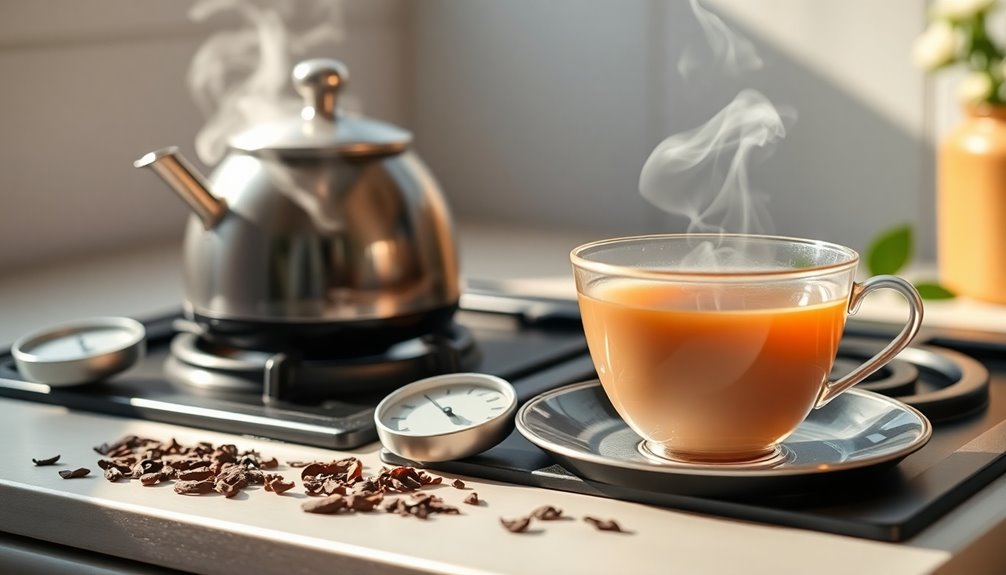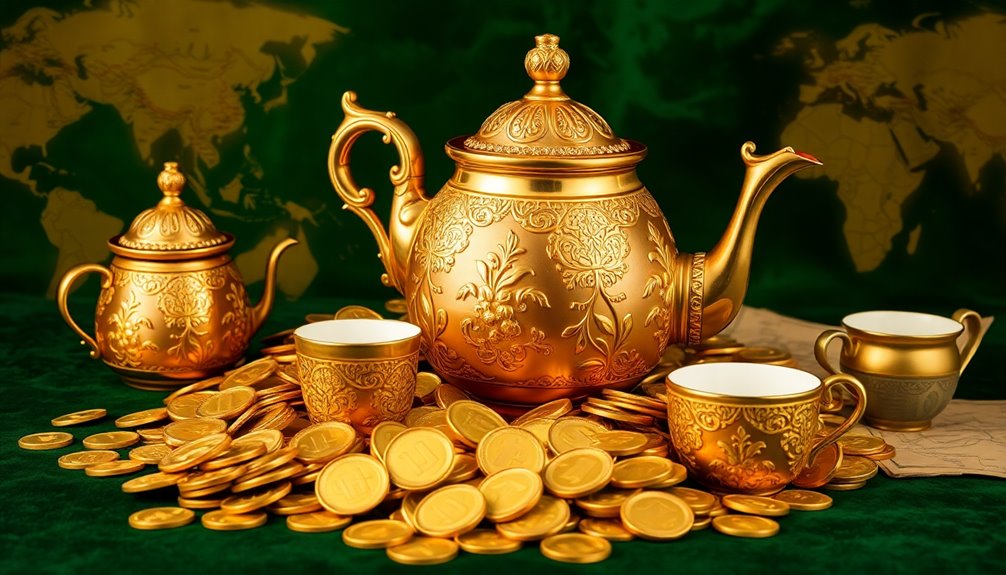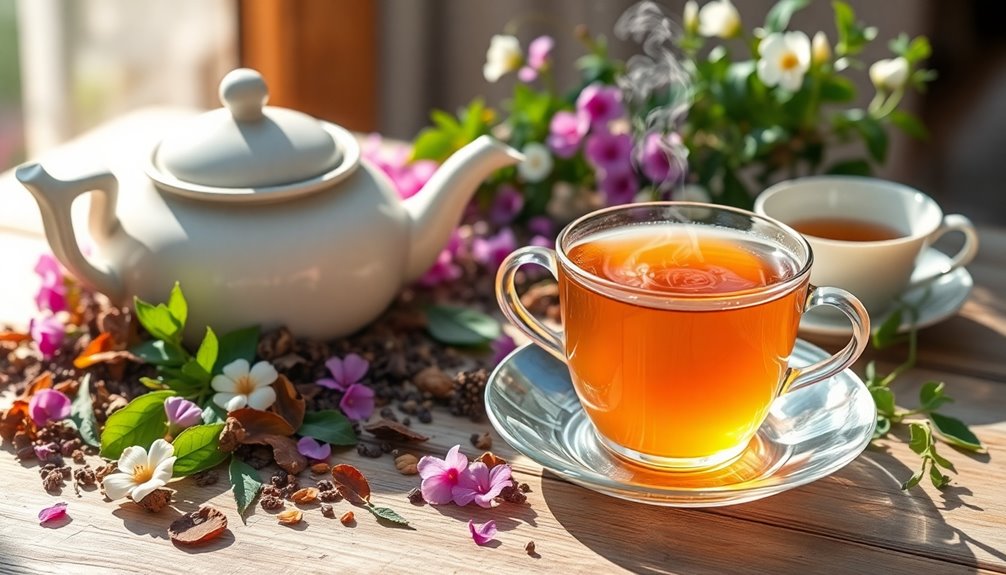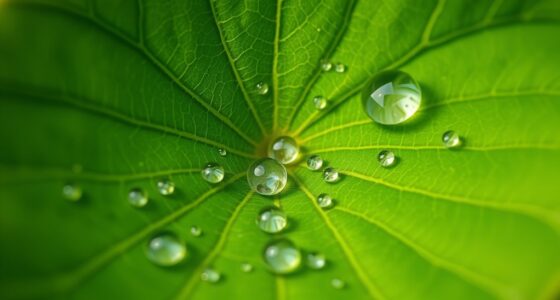Water temperature is super important for making the best cup of tea, and here's why! Different teas need different temperatures to taste just right. For example, green tea loves cooler water around 160-180°F, while black tea gets cozy at 200-212°F. If you use the wrong temperature, your tea can turn bitter or lose its yummy flavors! Plus, brewing at the right heat helps bring out healthy goodies, like antioxidants. So, if you want your tea to taste amazing and give you a boost, remember to check the temperature! Stick around, and you'll discover more tasty tips!
Key Takeaways
- Correct water temperature ensures optimal flavor extraction from different tea types, enhancing the overall drinking experience.
- Brewing green tea at 160-180°F (71-82°C) prevents bitterness and maximizes health benefits like polyphenol release.
- Higher temperatures, around 200-212°F (93-100°C), are necessary for black and herbal teas to extract their full flavors and nutrients.
- Brewing times must be balanced with temperature; improper combinations can lead to undesirable flavors and diminished health benefits.
- Pre-warming teapots helps maintain consistent temperatures, ensuring better brewing results for loose leaf tea.
Introduction
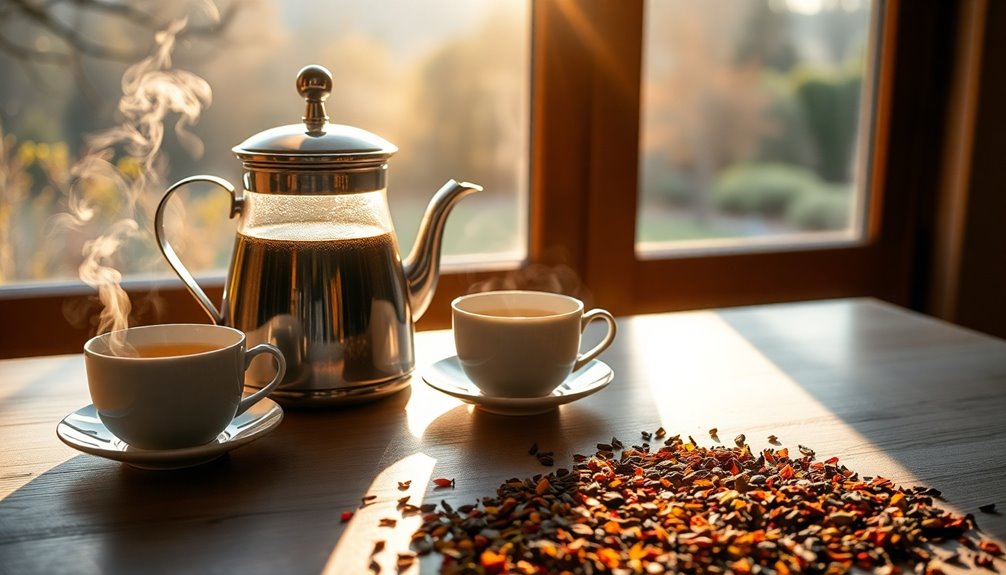
Brewing tea may seem simple, but getting the water temperature just right is essential for unlocking its full flavor potential. Imagine brewing a cup of green tea. If you pour boiling water over those delicate leaves, you might end up with a bitter taste instead of the refreshing flavor you hoped for! Green tea loves a cozy temperature between 160 and 180°F (71-82°C).
On the other hand, black teas thrive in hot water, around 200 to 212°F (93-100°C). Each tea type has its perfect brewing temperatures, and using the right water temperature can make a big difference in your tea's flavor profile.
If you want to enjoy the light, sweet notes of white tea, remember it needs gentle heat, too! When you brew tea at the right temperature, you're allowing beneficial compounds, like polyphenols, to dissolve properly, which not only boosts the flavor but also adds health benefits!
Tea Flavor Extraction Dynamics
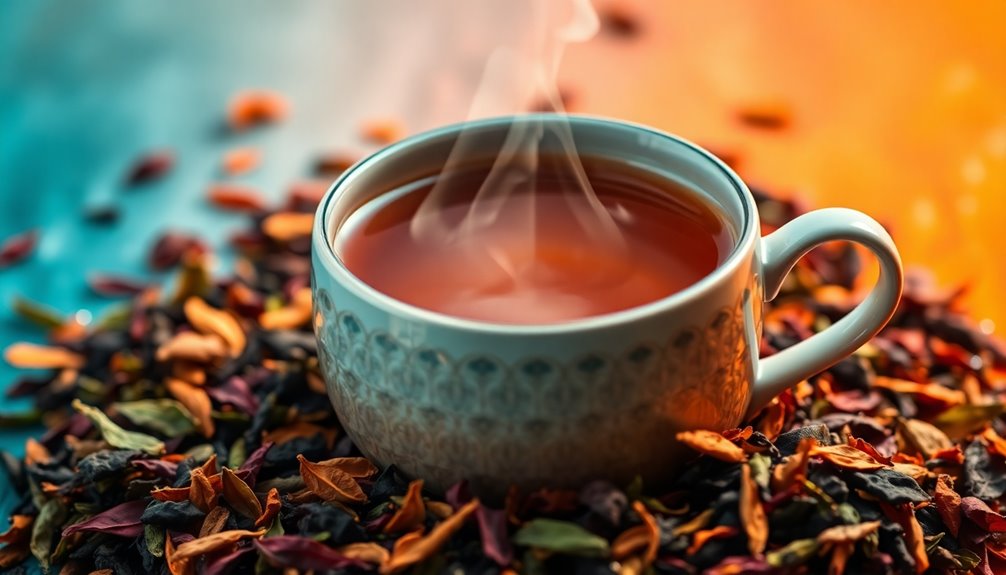
When brewing green tea, for example, using water that's too hot can make the delicate leaves bitter and astringent. Instead, you want to stick to a brewing temperature between 160-180°F (71-82°C). This helps release the yummy flavors without ruining them!
Different tea types need different temperatures for the best flavor extraction. Oolong tea, for instance, loves boiling water around 212°F (100°C) because its mature leaves need that heat to share their full flavor.
If you're brewing delicate teas, like white or green, remember that cooler water is key to keeping their flavors balanced and delightful. Additionally, using the correct brewing temperature can enhance the overall tea experience by optimizing flavor profiles.
Optimal Temperatures Enhance Flavor
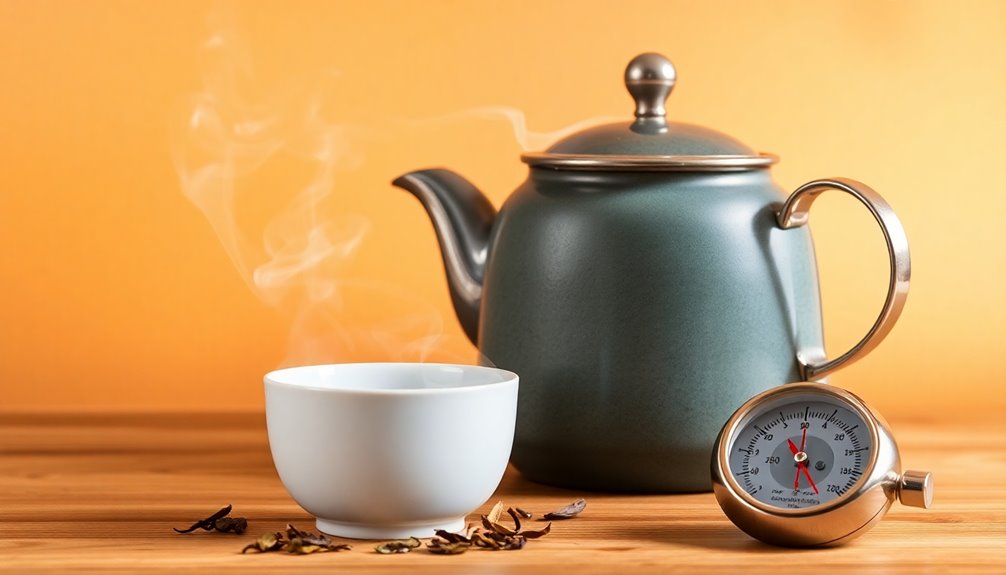
Finding the right water temperature is key to enhancing the flavor of your tea. Each type of tea, whether it's green teas or black tea, has its own ideal brewing temperature.
For green tea, using water at 160-180°F (71-82°C) helps protect those delicate leaves from burning, which can create a bitter taste. On the other hand, black tea shines at 200-212°F (93-100°C), ensuring proper flavor extraction and a robust cup.
If you brew tea with water that's too cold, you might end up with a weak flavor that doesn't show off the tea's true character. That's no fun!
Experimenting with different water temperatures can really boost your tasting experience. You'll get to discover your favorite flavors and the unique notes of each tea type.
Tea Temperature Affects Health Benefits
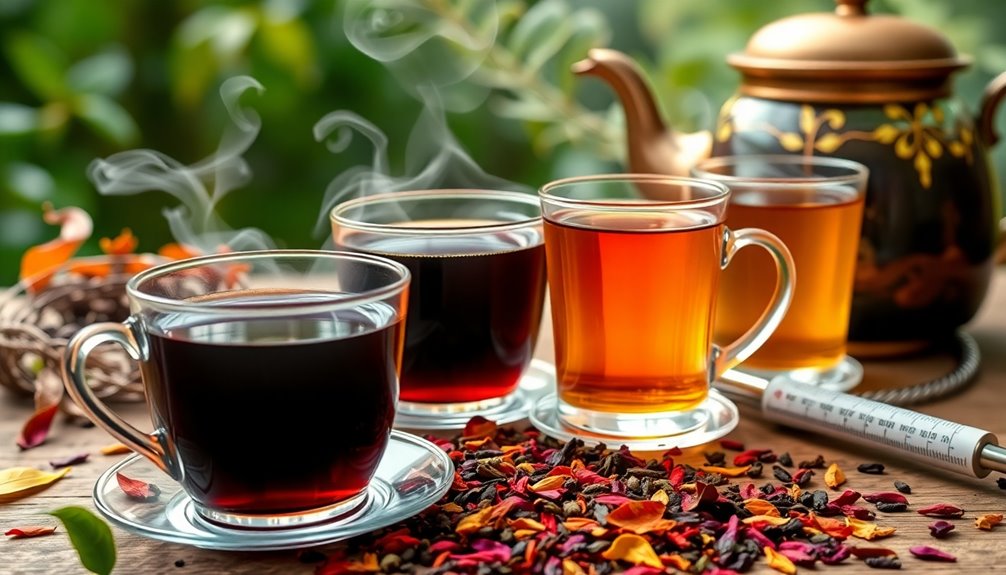
The temperature at which you brew your tea plays a crucial role in unlocking its health benefits. When you use the right water temperature, you help the tea leaves release their special nutrients, called polyphenols. These antioxidants can help keep your heart healthy and even reduce inflammation!
For example, if you're brewing green tea, aim for a cozy 160-180°F (71-82°C). This way, you'll get the fresh tea polyphenols that work wonders for your body.
On the other hand, if you're steeping herbal teas, it's best to bring your water to a boil at 212°F (100°C). Doing this maximizes the vitamins and antioxidants that can give your immune system a boost and help with digestion.
If you love black tea, brewing it at around 200-212°F extracts flavonoids, which promote heart health and lower the risk of chronic diseases.
Just remember, using the proper brewing temperature not only keeps your tea tasting great, but it also preserves delicate nutrients. Additionally, different types of flower teas, such as Hibiscus Tea, also require specific temperatures to fully release their beneficial properties.
Brewing Time and Temperature Conflicts
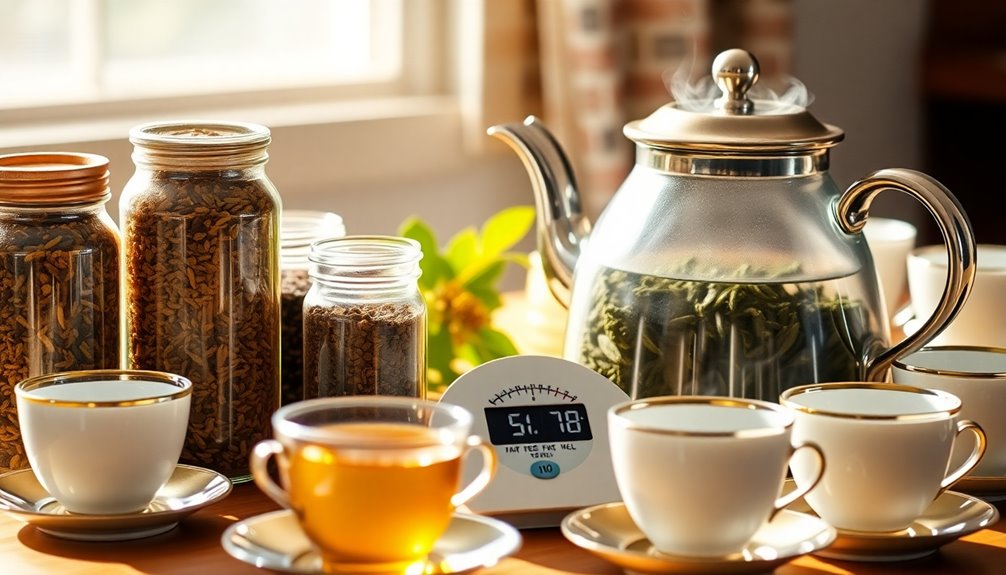
Brewing tea involves a delicate balance between time and temperature, and getting it right can elevate your experience. If you're a tea drinker, you know that different types of tea thrive at different temperatures and brewing times.
For example, green tea loves cooler water, steeped at 160-180°F (71-82°C) for just 1 to 3 minutes. If you go too hot or too long, you risk a bitter cup!
Now, let's talk about Oolong tea. To brew Oolong, you'll need water at 195-205°F (90-96°C) and let it steep for 2 to 5 minutes. The timing here is key; too long, and you could lose its wonderful flavor!
White tea is a bit of a diva, requiring cooler water (160-175°F or 71-80°C) for 4 to 5 minutes to keep its subtle notes intact.
Don't forget about herbal teas! They usually need boiled water (212°F or 100°C) and a longer steep of 5 to 7 minutes to fully bring out their rich flavors.
Practical Applications
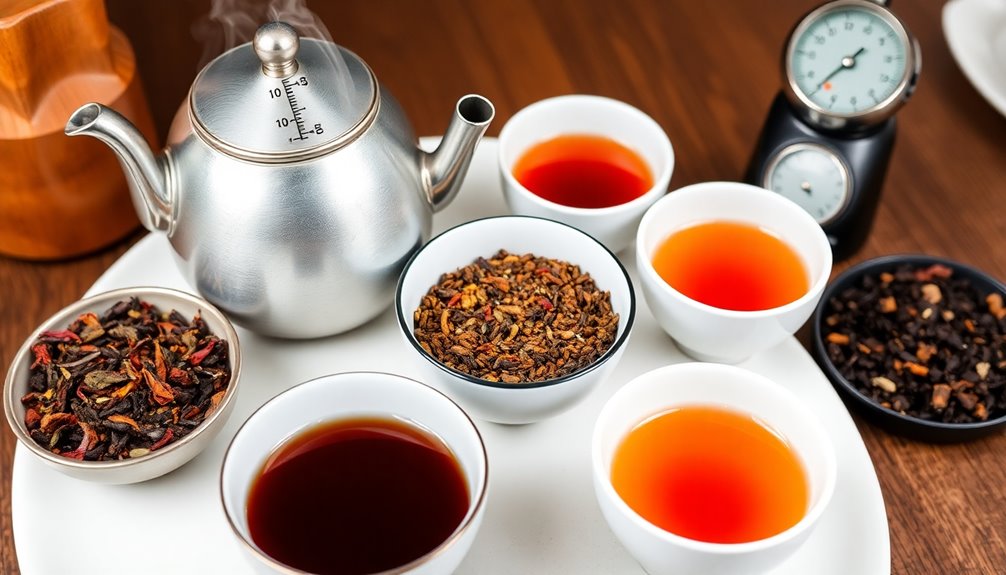
Understanding the right water temperature and steeping time isn't just theoretical; it's something you can apply directly to improve your tea experience.
When you brew white tea, for example, you'll want to use a lower temperature, around 160-185°F (71-85°C). This careful attention helps to preserve its delicate flavors, making each sip delightful.
For green tea, stick to a range of 160-180°F (71-82°C) to avoid a bitter cup. If you're in the mood for black tea, crank up that water temperature to about 200-212°F (93-100°C) to release its rich, robust flavors!
Herbal teas are a bit different; they love boiling water at 212°F (100°C) to fully extract all those wonderful tastes.
And don't forget about loose leaf tea! Pre-warming your teapot can keep the water temperature steady, letting the flavors bloom beautifully.
Experimenting with steeping times alongside water temperature helps you find the perfect balance for each type of tea.
Frequently Asked Questions
How Important Is Water Temperature for Tea?
Water temperature's incredibly important for tea. It influences flavor extraction and overall quality. If you don't brew at the right temperature, you risk bitter or weak flavors, so be mindful of your brewing practices.
Why Is It Better to Use Hot Water to Make Tea?
Using hot water to make tea helps you extract rich flavors and beneficial compounds from the leaves. It ensures a balanced infusion, prevents bitterness, and enhances the overall taste, giving you a satisfying cup every time.
What Temperature Water Makes the Best Tea?
To brew the best tea, you need to use specific water temperatures: 160-180°F for green tea, 200-212°F for black tea, and boiling for herbal tea. This ensures optimal flavor extraction and avoids bitterness.
How Does the Temperature of the Water Affect the Taste of Tea?
The temperature of the water directly influences tea's taste. Too hot can make it bitter, while too cold results in weak flavors. Finding the right temperature enhances your tea experience, unlocking rich aromas and satisfying flavors.
Conclusion
So, when you're brewing your favorite tea, remember that the right water temperature is super important! It helps bring out all those yummy flavors and even boosts the health perks. Just like Goldilocks, you want it not too hot and not too cold, but just right! With a little practice, you'll be a tea expert in no time, impressing friends with your perfect brews. Now, go grab a cup and enjoy your tasty adventure in tea!

